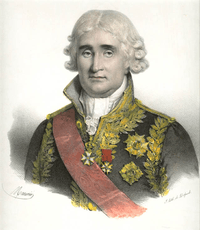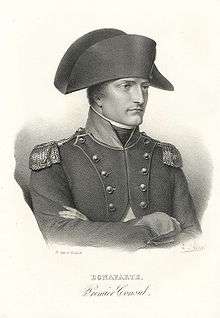Jean Jacques Régis de Cambacérès

Jean-Jacques-Régis de Cambacérès, 1st Duke of Parma (later 1st Duke of Cambacérès) (18 October 1753 – 8 March 1824) was a French lawyer and statesman during the French Revolution and the First Empire, best remembered as the author of the Napoleonic Code,[1] which still forms the basis of French civil law and inspired civil law in many countries.
Biography
Cambacérès was born in Montpellier, into a family of the legal nobility.[1] His brother Étienne Hubert de Cambacérès later became a cardinal. In 1774 he graduated in law and succeeded his father as councillor in the Montpellier court of accounts and finances. He was a supporter of the French Revolution of 1789, and was elected as an extra deputy to represent the nobility of Montpellier (in case the government doubled the nobility's delegation) at the meeting of the Estates-General at Versailles, but since the delegation was not increased he never took his seat. In 1792 he represented the department of Hérault in the National Convention which assembled and proclaimed the First French Republic in September 1792.
In revolutionary terms, Cambacérès was a moderate. During the trial of Louis XVI he protested that the Convention did not have the power to sit as a court and demanded that the king should have due facilities for his defence. Nevertheless, when the trial proceeded, he voted with the majority that declared Louis to be guilty, but recommended that the penalty should be postponed until it could be ratified by a legislative body.
In 1793, Cambacérès became a member of the Committee of General Defence, but was not a member of its famous successor, the Committee of Public Safety, until the end of 1794, during the Thermidorian Reaction after the Reign of Terror had ended. In the meantime he worked on much of the legislation of the revolutionary period. During 1795 he was also employed as a diplomat, and negotiated peace with Spain, Tuscany, Prussia and the Netherlands.
Cambacérès was considered too conservative to be one of the five Directors who took power in the coup of 1795, and finding himself in opposition to the Executive Directory he retired from politics. In 1799, however, as the Revolution entered a more moderate phase, he became Minister of Justice. He supported the coup of 18 Brumaire (in November 1799) that brought Napoleon Bonaparte to power as First Consul in a new regime designed to establish a stable constitutional republic.
The Napoleonic Code

In December 1799, Cambacérès was appointed Second Consul under Bonaparte. He owed this appointment to his vast legal knowledge and his reputation as a moderate republican. His most important work during this period was the drawing up of a new Civil Law Code, later called the Napoleonic Code, France's first modern legal code. The Code was promulgated by Bonaparte (as Emperor Napoleon) in 1804. It was the work of Cambacérès and a commission of four lawyers.
The Code was a revised form of Roman law, with some modifications drawn from the laws of the Franks still current in northern France (Coutume de Paris). The Code was later extended by Napoleon's conquests to Poland, Italy, the Netherlands, Belgium, western Germany and Spain, and indirectly to the Spanish colonies in Latin America. Cambacérès's work has thus been enormously influential in European and American legal history. Versions of the Code are still in force in Quebec and Louisiana.
The Code dealt with Civil Law; other codes ensued for Penal Law, criminal procedure, and civil procedure.
Cambacérès and homosexuality
The common belief that Cambacérès is responsible for decriminalizing homosexuality in France is in error.
Before the French Revolution, sodomy had been a capital crime under royal legislation. The penalty was burning at the stake. Very few men, however, were ever actually prosecuted and executed for consensual sodomy (no more than five in the entire eighteenth century). Sodomites arrested by the police were more usually released with a warning or held in prison for (at most) a few weeks or months. The National Constituent Assembly abolished the law against sodomy when it revised French criminal law in 1791 and got rid of a variety of offenses inspired by religion, including blasphemy; since there was no public debate, its motives remain unknown (a similar state of affairs occurred during the early years of the Russian Revolution).[2]
Cambacérès was a homosexual, his sexual orientation was well-known, and he does not seem to have made any effort to conceal it. He remained unmarried, and kept to the company of other bachelors. Napoleon is recorded as making a number of jokes on the subject.[3] Robert Badinter once mentioned in a speech to the French National Assembly, during debates on reforming the homosexual age of consent, that Cambacérès was known in the gardens of the Palais-Royal as "tante Turlurette".[4]
In fact, however, Cambacérès was not responsible for ending the legal prosecution of homosexuals. He did play a key role in drafting the Code Napoléon, but this was a civil law code. He had nothing to do with the Penal Code of 1810, which covered sexual crimes.
The authors of the Penal Code of 1810 had the option of reintroducing a law against male homosexuality (as was eventually done in the Soviet Union), but there is no evidence that they even considered doing so. This had nothing to do with the influence of Cambacérès, as recent research has shown. However, Napoleonic officials could and did repress public expressions of homosexuality using other laws, such as "offenses against public decency." Nevertheless, despite police surveillance and harassment, the Revolutionary and Napoleonic era was a time of relative freedom for homosexuals and opened the modern era of legal toleration for homosexuality in Europe. Napoleonic conquests imposed the principles of Napoleon's Penal Code (including the decriminalization of homosexuality) on many other parts of Europe, including Belgium, the Netherlands,the Rhineland, and Italy. Other states freely followed the French example (for example, Bavaria in 1813 or Spain in 1822).[5]
Later career
Cambacérès disapproved of Bonaparte's accumulation of power into his own hands, culminating in the proclamation of the First French Empire on 18 May 1804. But he retained high office under Napoleon: Arch-Chancellor of the Empire and President of the House of Peers from 2 June, to 7 July 1815. He also became a prince of the Empire and in 1808 was made Duke of Parma (French: duc de Parme). His duchy was one of the twenty created as duché grand-fief (among 2200 noble titles created by Napoleon)—a rare hereditary honor, extinguished upon Cambacérès's death in 1824; even rarer, it was created in another part of the peninsula than Napoleon's own kingdom of Italy.
Under Napoleon, as under the revolutionary regime, he was a force for moderation, opposing adventures such as the invasion of Russia in 1812. As Napoleon became increasingly obsessed with military affairs, Cambacérès became the de facto domestic head of government of France, a position which inevitably made him increasingly unpopular as France's economic situation grew worse. His taste for high living attracted hostile comment. Nevertheless, he was given credit for the justice and moderation of his government, although the enforcement of conscription was increasingly resented towards the end of the Napoleonic Wars.
When the Empire fell in 1814 Cambacérès retired to private life, but was recalled during Napoléon's brief return to power in 1815. After the restoration of the monarchy, he was in danger of arrest for his revolutionary activities, and he was exiled from France in 1816. But the fact that he had opposed the execution of Louis XVI counted in his favour, and in May 1818 his civil rights as a citizen of France were restored. From 1815 on, Cambacérès used the title of Duke of Cambacérès (on the fall of the Empire, the Duchy of Parma passed to former Empress Marie Louise). He was a member of the Académie française, and lived quietly in Paris until his death in 1824.
Freemasonry
Cambaceres was admitted to the lodge of "Les Amis Fidèles" in Montpellier in 1775. During Napoleon's reign, he was charged by the Emperor to monitor Freemasonry in France. From 1805 to 1815, he was the assistant of Joseph Bonaparte, Grand Master of Grand Orient de France, and managed the post-revolutionary rebirth of French freemasonry. During his term, more than 1200 lodges were created.[6][7][8][9]
In 1999, French gay and lesbian Freemasons established a fraternal association called "Les Enfants de Cambacérès"[10] ("The Children of Cambacérès").
References
- 1 2
 Chisholm, Hugh, ed. (1911). "Cambacérès, Jean Jacques Régis". Encyclopædia Britannica (11th ed.). Cambridge University Press.
Chisholm, Hugh, ed. (1911). "Cambacérès, Jean Jacques Régis". Encyclopædia Britannica (11th ed.). Cambridge University Press. - ↑ Michael Sibalis, “The Regulation of Male Homosexuality in Revolutionary and Napoleonic France, 1789-1815,” in Homosexuality in Modern France, ed. Jeffrey Merrick and Bryant T. Ragan (New York, Oxford University Press, 1996). 80-101.
- ↑ Jean-Louis Bory, Les cinq girouettes ou servitudes & souplesse de son Altesse Sérénissime le Prince Archichancelier de l'Empire Jean-Jacques Régis de Cambacérès duc de Parme (Paris: Ramsay, 1979).
- ↑ Proceedings of the National Assembly, 2nd sitting of 20 December 1981, p. 5371
- ↑ Michael Sibalis, "The Age of Enlightenment and Revolution," in Robert Aldrich, Gay Life and Culture: A World History (London: Thames & Hudson, 2006), pp. 117-19.
- ↑ La Franc-maçonnerie sous l'Emprire : un age d'or ? article : La Franc maçonnerie et l'Etat napoleonien - page 141 (Eric Saunier - Dervy ed. - 2007)
- ↑ Histoire de la franc-maçonnerie en France – page 231 Jean André Faucher and Achille Ricker
- ↑ Cambacérès : Le Premier surveillant de la franc-maçonnerie impériale (Pierre-François Pinaud - Editions maçonniques de France - 1999)
- ↑ Cambacérès : Unificateur de la franc-maçonnerie sous le Premier Empire (Jean-Paul Delbert - Grands caractères ed. - 2005)
- ↑ Les Enfants de Cambacérès
External links
| Wikimedia Commons has media related to Jean-Jacques-Régis de Cambacérès. |
- (French) The House of Cambacérès
- (French) French Council of State website on Cambacérès
- The Code Napoléon
| Political offices | ||
|---|---|---|
| Preceded by Three Provisional Consuls Napoleon Bonaparte Roger Ducos Joseph Sieyes |
Head of State of France Second Consul, along with: Napoleon Bonaparte (First Consul) Charles-François Lebrun (Third Consul) 1799–1804 |
Succeeded by Napoleon I (as Emperor of the French) |
._D%C3%A9claration_des_Droits_et_des_Devoirs_de_l'Homme_et_du_Citoyen.jpg)
